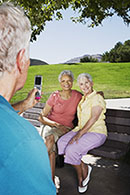Frequently Asked Questions
How much will this cost me?
Nothing, until we win the case. You will only pay attorney’s fees and costs if we obtain a monetary recovery for you.
I value my privacy. Will the details of my case, including the amount of money that I receive from the case, remain confidential?
Yes. We do everything we can to protect the privacy of our clients. The details of your case, including the amount of money that you receive, is strictly confidential and private, and will not be revealed to anyone unless a judge orders it or there is a law that requires it.
My mom is 92 and frail, and really isn’t in a position to be suing her nursing home; can someone else sue the nursing home on her behalf?
Yes. Florida law allows any person to sue who is acting on behalf of the resident and with the resident’s consent (usually a relative, healthcare surrogate, guardian, or POA).
Can I still sue my dad’s nursing home (or hospital) if he is on Medicare or Medicaid?
Yes.
I plan to sue my mother’s nursing home. Should I move her to a different facility?
Yes, if you can. But if you can’t—for example, if there are no other facilities close to you, or there’s no bed available, or the other nursing homes in the area have a bad reputation, etc.—then stay where you are. Also, keep in mind that moving an elderly resident to a new environment can adversely affect the resident’s health. The bottom line is that staying at the nursing home is not going to hurt your case, especially if you have a good reason for not transferring to a different facility. It has also been our experience that when a nursing home is sued and the resident still resides at the facility, the care usually improves dramatically.
The nursing home staff advised me that my dad’s bedsore was “unavoidable” because of his peripheral vascular disease (PVD). What does that mean?
When a resident has PVD, it usually means there is a decreased blood supply, often to the legs and feet. Whenever a resident has PVD or is a diabetic, the nursing home usually takes the position that any bedsore that develops was “unavoidable” due to the resident’s poor circulation (and therefore not the staff’s fault). But not every resident who has diabetes or PVD will develop a bedsore. A diabetic resident gets a bedsore for the same reason any other resident does—poor care provided by the nursing home staff. If proper care is provided and preventative measures are taken, even a diabetic resident can avoid developing a bedsore. If, in fact, diabetic residents and residents with PVD are at greater risk for developing bedsores, then the staff should be even more vigilant in providing proper care to such residents to prevent the development of bedsores.
I tried to take a picture of my mother’s bedsore and the nursing home staff told me photography was not allowed. Is this true?
 No! Do you think the nursing home staff would have stopped you from taking pictures if you were celebrating your mother’s birthday? Of course not. The staff doesn’t want any pictures taken of bedsores because they know full well that the pictures are evidence of their own negligence. So take as many pictures as you like—the more the better!
No! Do you think the nursing home staff would have stopped you from taking pictures if you were celebrating your mother’s birthday? Of course not. The staff doesn’t want any pictures taken of bedsores because they know full well that the pictures are evidence of their own negligence. So take as many pictures as you like—the more the better!
My mom fell at her nursing home and the staff advised me that there were no “obvious” injuries from the fall, but I suspect she was injured. The staff is refusing to call 911 so she can be evaluated at the hospital. Am I allowed to call 911?
Absolutely. It would be no different than if your mom fell at a restaurant and possibly fractured her hip—you would not hesitate to call 911, nor should you hesitate just because she’s in a nursing home. In fact, if you are your mother’s healthcare surrogate or power of attorney, it is your duty to call 911 if you suspect an injury. After all, you know your mother better than the staff does. And even if your mother turns out to be fine after being evaluated at the hospital, that’s great— better to be safe than sorry.
I have hired attorneys before and did not hear from them for months at a time. Will I be kept informed of the status of my case as it progresses?
Absolutely. Each client is kept informed of the status of his or her case as it progresses via correspondence, emails and phone calls. We will also send you copies of letters, pleadings, discovery and other documents that we prepare for your case, as well as copies of relevant documents that we receive from opposing counsel.
What is a DNR?
 A DNR (Do Not Resuscitate) is an Order by the patient’s physician stating that in the event the patient has a cardiac arrest, cardiopulmonary resuscitation (CPR) is to be withheld, thereby allowing the patient to die a natural death. A DNR Order cannot be entered unless the patient has requested it (or the patient’s Healthcare Surrogate). Patients who do not have a DNR are called “Full Code”, meaning that in the event of a heart attack, all measures are to be taken in an effort to save the patient’s life. Many times, when a resident is first admitted to a nursing home, or when a patient is admitted to a hospital, the family is asked whether he or she has a DNR, and if not, whether you want to sign one. Or you may be asked later on if you want to sign a DNR when your loved one has taken a turn for the worse. You should never feel pressured to sign a DNR; if you are unsure, just say no. You are not required to give a reason for your decision, nor should you.
A DNR (Do Not Resuscitate) is an Order by the patient’s physician stating that in the event the patient has a cardiac arrest, cardiopulmonary resuscitation (CPR) is to be withheld, thereby allowing the patient to die a natural death. A DNR Order cannot be entered unless the patient has requested it (or the patient’s Healthcare Surrogate). Patients who do not have a DNR are called “Full Code”, meaning that in the event of a heart attack, all measures are to be taken in an effort to save the patient’s life. Many times, when a resident is first admitted to a nursing home, or when a patient is admitted to a hospital, the family is asked whether he or she has a DNR, and if not, whether you want to sign one. Or you may be asked later on if you want to sign a DNR when your loved one has taken a turn for the worse. You should never feel pressured to sign a DNR; if you are unsure, just say no. You are not required to give a reason for your decision, nor should you.
What are residents’ rights?
These are rights guaranteed by Florida law to every nursing home resident, the violation of which can form the basis of a lawsuit against the nursing home. Probably the three most often cited residents’ rights in nursing home litigation are (1) the right to receive adequate and appropriate health care; (2) the right to be free from mental and physical abuse; and (3) the right to be treated courteously, fairly, and with the fullest measure of dignity. Other residents’ rights include the right to private visits; the right to manage one’s own financial affairs; the right to privacy in treatment; the right to be informed of one’s medical condition and proposed treatment; and the right to select a personal physician.
Do I have to sign in each time I visit?
No, and you shouldn’t. If you sign in every time you visit, the sign-in sheets may show a pattern, which allows the staff to predict when you will be visiting and they can prepare accordingly. More importantly, if you decide to sue the nursing home, the nursing home lawyer will want to know how often you visited your loved one at the nursing home. If you say weekly and you happen to have missed a week here and a week there, you can be sure the nursing home’s lawyer will have the sign-in sheets to prove you a liar. So don’t sign in every time you visit; there’s no law that requires you to do so.
